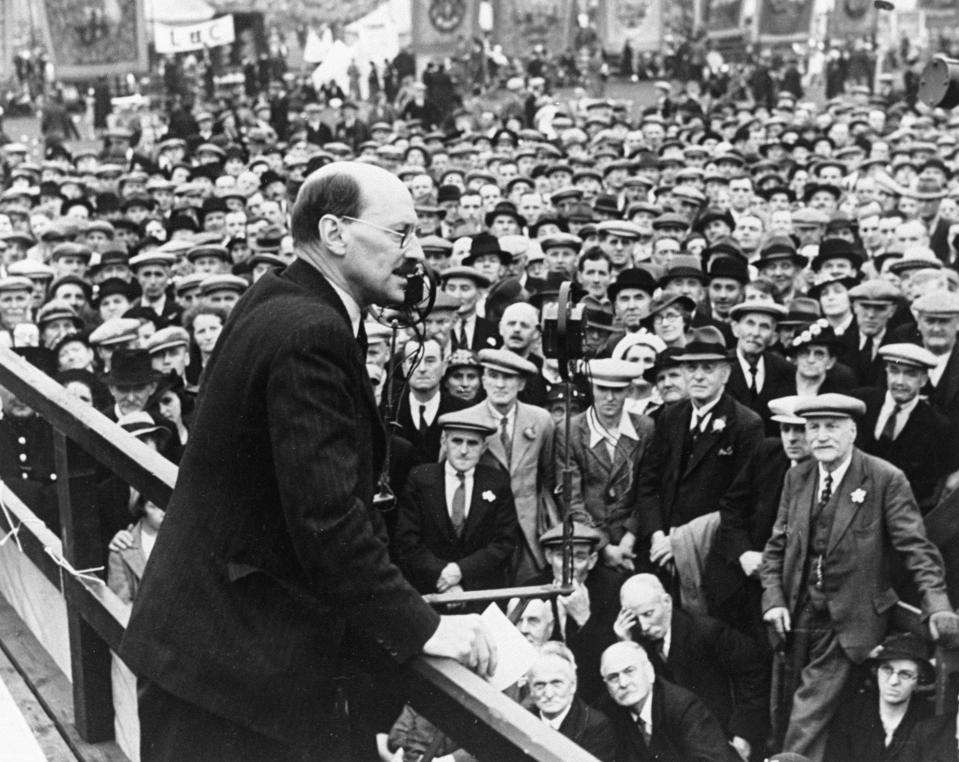Coronavirus: Unions demand Attlee postwar-style shakeup of UK economy

Unions are calling for wide-ranging reforms and sustained stimulus as part of the UK’s recovery from the coronavirus crisis, urging the government to learn lessons from the first post-war Labour government.
A new report by the Trades Union Congress (TUC), which represents most UK unions, says concerns over soaring public debt are overblown and calls for austerity cuts misplaced. It highlights record low interest rates and warns a decade of public spending cuts exacerbated the last crisis, instead arguing that investing wisely will help reduce debt by growing the economy.
It says lessons can be learned from former prime minister Clement Attlee’s 1945 government, which inherited eye-watering wartime debts but saw them slide rapidly as the economy recovered. The Labour administration launched the NHS, a welfare safety net and mass housebuilding, nationalised industries and sought to boost demand to maintain full employment.
But many of the reforms are likely to receive a cool response among some policymakers, companies and investors, with the government and firms focused on short-term crisis management and wary about the rising costs of existing crisis measures.
READ MORE: More crisis loans for UK firms - if they scrap dividends
The TUC’s ‘A Better Recovery’ report called for:
A “green recovery” to reduce carbon emissions and create jobs, including support for investment in clean industry and transport, making buildings net-zero, and carbon capture and storage.
Conditions attached to government support for firms, from “fair pay and employment plans” to even taking stakes in companies.
Corporate governance reforms, including giving workers a third of board seats at large firms and making long-term success a primary aim among directors’ duties.
Pension contributions for workers on low pay or for those under 22, who employers do not have to enrol in schemes.
A jobs guarantee scheme for those at risk of long-term unemployment, with government-funded training placements at employers.
The reversal of adult skills funding cuts, a right for all adults to upskill or retrain including entitlements to paid time off for training, and an all-age careers guidance service in England.
Pay rises for public sector and minimum wage workers, rewarding many staff’s “huge sacrifices” during the pandemic after a significant wage squeeze over the past decade.
A fairer funding settlement for NHS and council services, with some local authorities at “the verge of collapse” as the virus pushes up costs and knocks their income on top of a decade of cutbacks.
“Choosing the wrong approach to recovery now risks embedding low growth, long-term unemployment and all the social ills that go alongside,” warned the report. “The government’s interventions show the speed and scale of what can be done when necessary.”
TUC general secretary Frances O’Grady acknowledged at a virtual panel event to launch the report on Wednesday that taxes may have to rise to fund some of the measures.
READ MORE: Youth unemployment fears as school leaver hiring drops by a third
She said most voters were “prepared to pay a bit more” for public services if they were confident the wealthiest in society were paying a fair share.
The government has already launched previously unthinkable reforms in a bid to stave off the worst effects of the pandemic and lockdown on firms and jobs. Millions of workers are on paid leave via its job retention scheme to stave off mass lay-offs, while firms have been offered state-backed loans and extra funding has been ploughed into many frontline services.
A Treasury spokesperson said: “The Chancellor has been clear that the economic priority now is to mitigate the economic impact of Coronavirus as far as possible- which is what we’re doing through our unprecedented package of measures protecting businesses and jobs.
“The best way out of the crisis for all of us is to grow the economy and spread opportunity, which is why we’re trying to protect the economy as much as possible to allow us to bounce back.”

 Yahoo Finance
Yahoo Finance 